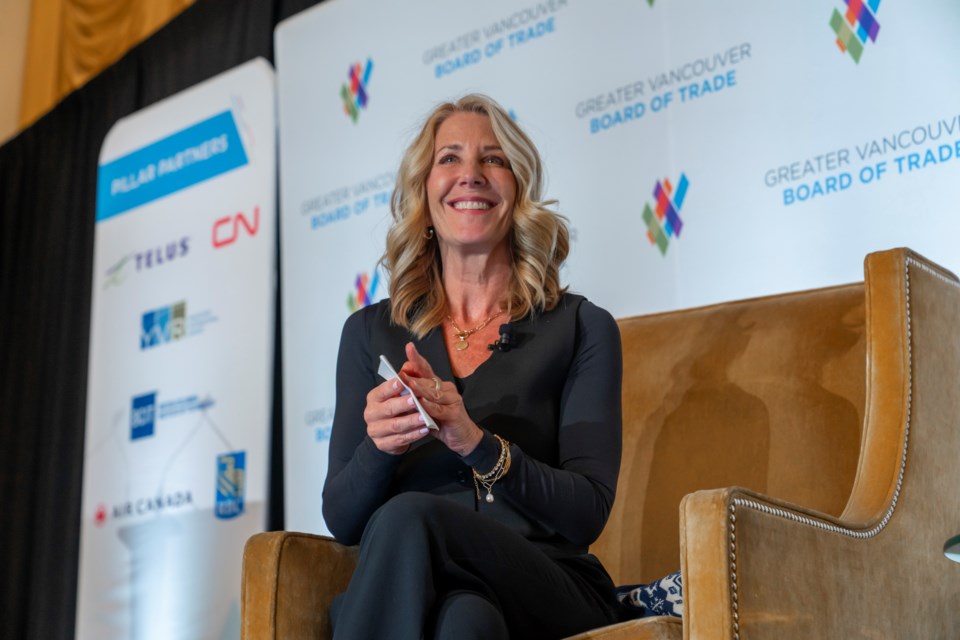The Greater Vancouver Board of Trade this week gave B.C. Premier David Eby's office a set of recommendations to call on how it wants the B.C. government to take action to fuel the province's artificial intelligence sector, its CEO Brigitte Anderson told BIV Wednesday.
Anderson is urging B.C. to create academic courses and "micro-credentials or certifications" to help power a workforce ready to be part of the AI niche that is changing how business operates.
"As far as we know, there is no digital-skills index for the workforce in B.C., but we should be doing that," Anderson said.
Micro-credential programs in B.C. for AI exist in B.C.
Simon Fraser University, for example, has its Applied AI for Professionals program.
"These programs create bite-sized chunks of learning," Rob Goehring, CEO of the AI Network of B.C. industry association, told BIV.
"People mid-career can't go back to university for four years, so picking up these micro-credentials along the way, on very specific topics, is a great way to help up-skill and reskill people."
The GVBOT released a report Wednesday that outlined broad recommendations. For example, it urged the B.C. government to:
- encourage and enable the public and private sectors to adopt AI;
- ensure a sufficient AI talent pool for B.C. businesses; and
- harness data for the public good.
The move comes in the lead-up to next week's Web Summit, which the B.C. government helped land and which Anderson called the "Olympics for the tech sector."
The B.C. government teamed with Destination Vancouver, the City of Vancouver, Invest Vancouver, Innovate BC and the federal government’s Pacific Economic Development Canada to provide about $20 million over three years to lure the organization for its 2025, 2026 and 2027 conferences, Destination Vancouver CEO Royce Chwin told BIV last week.
The four-day event is expected to attract more than 15,000 people to Vancouver, including international entrepreneurs, investors, media, academics and executives.
"Government's role is to create the environment for businesses to thrive, so that they invest in their operations, so that they can grow and scale," Anderson said.
Having the Web Summit is one part of helping the region's technology businesses, she said.
Another way is "ensuring that there is a skilled and talented workforce that is ready to meet the challenges around AI, or whether it's creating that business environment that is supportive of AI adoption, or even leading the way itself [by] what it's doing internally around AI," she said.
In late 2024, the GVBOT partnered with KPMG to launch a program designed to help B.C. business leaders understand and be confident in adopting AI to operate more efficiently and be more attractive to customers, spurring sales growth. KPMG Canada and Microsoft Corp. (Nasdaq:MSFT) last year launched a separate, free initiative with AI learning modules.
Part of what government could do is leverage and support programs such as the GVBOT-KPMG one, the GVBOT report said.
"Programs like these would be targeted for workers to use readily available AI products," the report said. It would also provide what the GVBOT called a "roadmap" for further AI adoption.
Anderson said provincial tax credits have helped the province's film industry grow and thrive and she urged Finance Minister Brenda Bailey to initiate something similar for the tech sector, specifically for small- and medium-sized businesses within that sector.
"The finance minister is working on a budget for next spring that she has framed as an economic-growth budget to increase revenue for the province," Anderson said.
"One of the ways that she could do that is to have incentives for small- and medium-sized businesses to adopt AI."
Other provinces already have this, Goehring said, pointing to Quebec.
That province has an AI tax credit that is stacked on top of the federal government's Scientific Research and Experimental Development (SR&ED) tax-incentive program, he said.
"If you have five or six staff members and you are headquartered in Quebec, you can get an additional research-and-development tax credit on top of your SR&ED tax credits," he said. "That's amazing. It's an incredible incentive to build your company and staff it locally."
Bluesky.com/glenkorstrom.bsky.social



